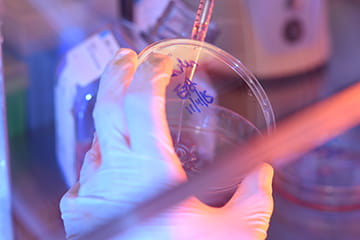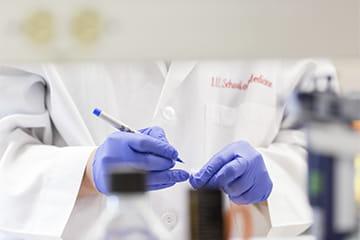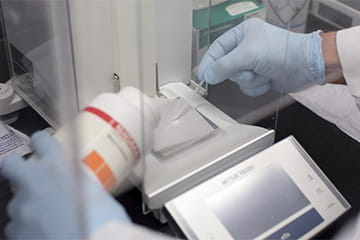Research being conducted by Vera Bradley Foundation breast cancer researchers at IU School of Medicine include the following areas of investigation related to new drug and product development for breast cancer treatment.
 Prevent or Reverse Cancer Metastasis
Prevent or Reverse Cancer Metastasis
Samy Meroueh, PhD, is interested in developing new therapeutic agents to prevent or reverse cancer metastasis. His laboratory has discovered the first inhibitors of uPAR, a receptor that is only expressed in cancer cells that are prone to spread to distant organs. Recently, Meroueh has discovered a small molecule that inhibits breast cancer cell invasion and bone colonization. His compounds stops metastasis in laboratory models by directly targeting the malignant cells. Meroueh is currently pursuing these novel small molecules in animals to evaluate their ability to prevent and inhibit bone metastasis.
 Detection Device for Triple-Negative Breast Cancer Biomarkers
Detection Device for Triple-Negative Breast Cancer Biomarkers
Milan Radovich, PhD, an expert in the genetic analysis of cancer, has embarked on an international research project. Radovich is collaborating with researchers at Purdue University and the University of Texas to develop a device to detect TNBC biomarkers in African women who are at high risk for this disease. His goal is to develop a low-cost and portable method for breast cancer detection appropriate to test in Kenya where health access and resources are scarce. Ultimately, the device could be utilized in U.S. public hospitals and become a routine screening device in all clinics.
 Combating Resistance to Chemotherapy
Combating Resistance to Chemotherapy
One reason that chemotherapy fails is that breast cancer is smart enough to reengineer its own DNA to become resistant to long-term treatment with the same drug. IU School of Medicine researcher Mark Kelley, PhD, has developed a compound that stabilizes the DNA so that it cannot evade treatment. His drug has just started clinical trials to evaluate safety and to see if it sustains chemotherapy effectiveness. Early data suggests that this drug might also prevent peripheral neuropathy, the painful tingling and numbness in hands and feet, a common side effect of chemotherapy.
Common drugs used for heartburn may also help manage this type of drug resistance by targeting a key enzyme that increases when breast cancer cells become resistant to chemotherapy. JT Zhang, PhD, studied this effect in laboratory animals and also mined health records to determine if women being treated with proton-pump inhibitors (the purple pills) while receiving breast cancer treatment lived longer than women who were not. Encouraged by early findings, a national clinical study, led by Kathy Miller, MD, is now underway to learn if this addition to therapy will benefit women treated for triple negative breast cancer.
 Painful Side Effects of Treatment
Painful Side Effects of Treatment
Breast cancer survivors carry the burden of treatment: painful nerves and bad hearts. Bryan Schneider, MD; Milan Radovich, PhD; and Kathy Miller, MD recently discovered a biomarker that will identify patients who may develop toxicity to taxane, one of the commonly used chemotherapies. This is the first step in preventing these painful and life-threatening side effects of treatment.
Aggressive Tumors and Recurrent Disease
Milan Radovich, PhD and his research team are focused on determining the best combination of therapies to treat triple negative breast cancer (TNBC)—a cancer notorious for evading standard treatment. He’s working on ways to predict how this cancer will outsmart the therapy and then treat it with a combination of two drugs—one aimed at the original target and the second to address the cancer’s escape pathway. After showing success in laboratory, the one-two punch drug combination therapy, referred to by Radovich and his colleagues as the “Whac-a-Mole” method, is being tested in a Phase 1 clinical trial designed by Kathy Miller, MD, that began enrolling patients in February. The pre-clinical work was funded entirely by philanthropy.
 Personalized Medicine
Personalized Medicine
Enrollment has more than doubled in the Vera Bradley Foundation-funded trial led by Bryan Schneider, MD. The Monogrammed Medicine trial is one of the first to look at the full genetics of a patient’s triple negative breast cancer (TNBC) tumor to determine therapy. Patients with this disease who have tumor remaining after initial treatment and have it surgically removed are invited to participate before active cancer returns. Blood samples are taken from every woman in the trial and, in a unique collaboration with researchers at Purdue University, scientists are identifying tumor cells that are in patient blood. They are captured and counted at the beginning and end of treatment. Less cells at the end of treatment points to the effectiveness of the therapy. The Vera Bradley Foundation informed patients directly about the trial through social media. Enrollment is complete.
Kenneth Nephew, PhD’s laboratory provided the scientific discovery that led to a new clinical trial proposed to one of the national Stand Up to Cancer dream teams. His research demonstrates that there may be a way to improve treatment for patients with triple negative breast cancer who are battling recurrence. After learning that inhibiting a protein called PARP controls advanced cancer more effectively than chemotherapy in women with a BRCA gene mutation, Nephew discovered a way to make cancers from women without a BRCA mutation susceptible to the new PARP inhibitors. The combination is being studied in women for the first time in the SU2C trial.
